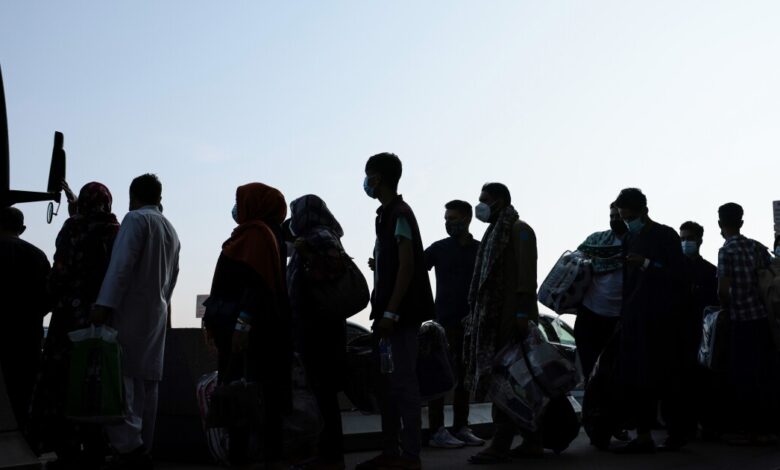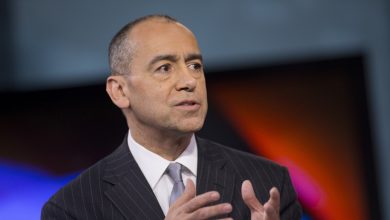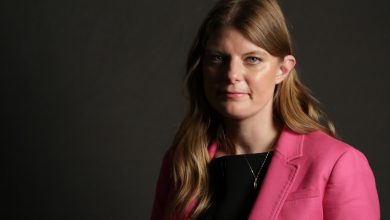Refugee Students Gain a New Path to U.S. Colleges. Here’s Why That’s a Big Deal.

[ad_1]
Refugees will soon have a new path to domestic colleges. A new plan backed by the U.S. State Department will enable qualified students to resettle in the United States, enroll at a participating institution, and obtain legal permanent residency, with the opportunity to apply for U.S. citizenship.
The new program, the Welcome Corps on Campus, will allow groups of Americans to privately sponsor refugee students attending college. The effort is meant to provide refugees with two things nearly all of them lack: access to postsecondary education and certainty about where they will live in the future.
The first-of-its-kind program will allow refugee students to enter the United States under a new private-sponsorship category of the U.S. Refugee Admissions Program. Unlike the F-1 visa system, which permits international students to live in the United States only temporarily, the new P4 category will enable refugees to stay in the country after completing their studies. International students attending U.S. colleges on F-1 visas aren’t eligible for federal aid. But as refugees, students in the program would be eligible. And they would also be permitted to work.
“This is a groundbreaking opportunity to increase equity and diversity in higher education,” said Miriam Feldblum, co-founder and executive director of the Presidents’ Alliance on Higher Education and Immigration, part of a consortium of nonprofit organizations supporting the program. “This is aligned with colleges’ missions and their desire to nurture talent that is everywhere, even though opportunity is not. U.S. institutions are really thinking more about internationalization and asking, ‘What are we doing in response to global crises?’”
Those crises are intensifying. At the end of 2022, 108.4 million people worldwide had been forcibly displaced due to conflict, persecution, violence, human-rights violations, or other disruptions, according to a recent report by the United Nations Refugee Agency, known as UNHCR. That represented an increase of 19 million people, compared with the end of 2021. That total includes more than 35 million refugees (forcibly displaced people who have crossed international borders).
Just 6 percent of all refugees worldwide have access to higher education, according to UNHCR. But many of them, Feldblum said, want to enroll in college — and have the ability to succeed there.
The Welcome Corps on Campus will expand the State Department’s Welcome Corps, a program that allows everyday Americans to form private sponsor groups that welcome incoming refugees into local communities and help them build a new life. Both programs are modeled after successful resettlement programs in Canada and several other countries.
The Welcome Corps on Campus will allow a minimum of five people over the age of 18 to form a sponsorship group. Its members — who might include administrators, faculty, staff, and students — must have a connection to a participating college and live in the community. Each group will commit to assisting a refugee student for 12 months.
This is aligned with colleges’ missions and their desire to nurture talent that is everywhere, even though opportunity is not.
That support network would help the student enroll in classes, find housing, secure essential services, and, in at least some cases, apply for a part-time job. The group would be responsible for raising additional funds and soliciting in-kind donations. The sponsors might help a student navigate campus bureaucracy one day and help them furnish their apartment the next. One crucial goal: to help the student become self-sufficient in an unfamiliar place.
“Providing day-to-day supports will make a huge difference to the young people we hope to welcome,” said Nele Feldmann, associate director of Welcome Corps on Campus at the Community Sponsorship Hub, which is leading the consortium of organizations that support the program. “There is such a sense of generosity in communities that is underdeployed. This can become a natural part of what colleges and universities in the U.S. do, providing life-changing opportunities with on- and off-campus supports.”
The Welcome Corps on Campus expects the first cohort of students to enroll in the fall of 2024. In the months ahead, the program’s partners plan to identify academically qualified refugees in two countries — Jordan and Kenya — who have already been referred for resettlement.
Jacqui J. Pilch, program manager for the Welcome Corps at the State Department, said she hopes the program will enroll a total of 300 refugees over the first three years. For now, the program will be open to refugee students pursuing an associate or bachelor’s degree. Whether or not refugee students with families would be eligible for the program has yet to be determined, Pilch said.
“We have seen across the country that campuses have already been developing their own unique programs that support refugees for many years now,” Pilch said. “We believe they are uniquely positioned to contribute to our resettlement program.”
Elsa Núñez, president of Eastern Connecticut State University, hopes to enroll one or two students through the Welcome Corps on Campus in 2024. Her institution was among 145 colleges and organizations that signed a statement of support for the program. She expects that her institution can fill any gaps in refugees’ financial-aid packages with institutional aid and funding from donors.
“When refugees are displaced from their homelands, it’s a different kind of hardship,” Núñez said. “They have no home, no safe haven, no certainty. This way, they will be able to say ‘I have a future.’”
James Atem said the program will help refugee students overcome some of the challenges he has confronted. After fleeing South Sudan with his family as a child, he grew up in a refugee camp in Kenya. He excelled in school and resolved to go to college.
Despite many challenges, Atem earned a bachelor’s degree in Kenya. He enrolled at Columbia University’s School of International and Public Affairs in 2021 and recently graduated with a master’s degree, with double specializations in United Nations studies and international conflict resolution. He hopes to earn a doctorate.
But Atem’s F-1 visa has expired, leaving his future uncertain. He applied for asylum, but, for now, he must wait for what is often a long process to unfold. Each morning he wakes up worrying that he could be deported at any time. “There’s not a guarantee that I can stay in the U.S.,” he said. “If I am not able to get full status and get a job, I will be homeless.”
Atem, who is staying at a friend’s apartment, has just a little money saved, enough to get through July, he said. Five days a week, he goes to his unpaid internship at the United Nations. On nights and weekends, he collects data and conducts interviews for a project that he hopes will become a book. It’s about sustainable peace in the 21st century.
The Welcome Corps on Campus, Atem believes, will be a game changer for refugee students in the United States. “Right now, I can’t work with government entities, even the U.S. Agency for International Development, because it requires permanent-resident status or U.S. citizenship,” Atem said. “Students in this new sponsorship program, they will not encounter what I’m going through currently.”
[ad_2]
Source link





